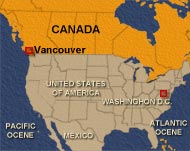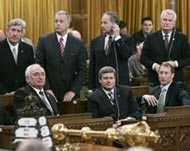Canada to raise lumber row at APEC
Canadian Prime Minister Paul Martin has promised to raise his country’s softwood lumber dispute with the US at the APEC summit in South Korea.

Martin said he will press US President George Bush on the latter’s refusal to pay Canada $5 billion, in accordance with a North American Free Trade Agreement (Nafta) ruling on the dispute, at the Asia-Pacific Economic Cooperation forum in Pusan.
The 20-year softwood lumber dispute has soured relations between the North American neighbours.
The dispute between Washington and Ottawa stems from US tariffs slapped on imported Canadian lumber, as a means of offsetting government aid provided to Canadian loggers.
In August 2003, a panel of Nafta judges ruled that 18% tariffs applied by the US to Canadian lumber exceeded the value of government aid provided to Canadian loggers.
Nafta ordered the US to pay Canada $5 billion in compensation. On November 16 Nafta gave the US one week to modify tariffs placed on imported lumber.
Primary aim
Canadian officials maintain they primarily seek secure relations with their North American counterpars. But they claim US refusal to abide by Nafta regulations has forced them to consider pursuing other options in Asia.
“Nafta governs the smooth and efficient trade of energy, as well as trade in softwood lumber and the effective resolution of disputes between Nafta partners.
 |
|
US-Canadian trade relations are |
By picking and choosing which obligations they will obey, the United States puts the whole of Nafta at risk,” said a spokesperson for the Canadian Minister of International Trade Brooke Grantham.
This is not the first time Martin will use a public forum to confront the US about the long-standing trade row between the two countries.
At the Summit of the Americas held recently in Argentina, Martin voiced his country’s continuing dissatisfaction with the US stance regarding the dispute.
Martin told the Mexican President Vincente Fox: “The fact is that President Fox, myself, President Bush, all of us believe strongly in the free trade of the Americas. But we know that it’s got to be based on rules and rules that are listened to.”
Less diplomatic
Martin was less diplomatic when he gave a speech in New York last month. He implied that if the US maintained its refusal to abide by the Nafta ruling the dispute may spill into the energy sector.
He hinted that Canada, America’s biggest energy supplier, may begin selling oil to markets in India and China.
|
“No one wants a trade war, but we have to have more markets and secure markets” Canadian Prime Minister Paul Martin |
“No one wants a trade war, but we have to have more markets and secure markets. That’s why we’re reaching out to China and India. That’s why we want Nafta respected – to ensure security of trade,” Grantham’s spokesperson told Aljazeera.net.
But Canadian opposition parties are not convinced of Martin’s approach.
“We know the Americans can’t take this Liberal prime minister’s positions seriously because he doesn’t take it seriously himself,” said Conservative Party spokesperson Ted Menzies.
“He (Martin) has flip-flopped on his softwood position from public tough talk on shows of ‘good faith’ to hollow threats over linkage to Canada‘s oil and gas exports.”
Not honest
New Democratic Party spokesperson Jim Caucus told Aljazeera.net he does not believe Martin is being honest about the lumber dispute and that nothing concrete is being done to resolve the issue.
For its part, the US government has made it clear that it will not pay Canada the $5 billion and has insisted on a negotiated settlement instead.
 |
|
Conservatives think Martin has |
US Secretary of State Condoleeza Rice said during a recent trip to Ottawa: “I did not come here with a cheque for five billon dollars.”
The US has taken recourse in a 2004 WTO confidential interim report that found US claims of injury were consistent with WTO obligations.
Replying to questions from Aljazeera.net, Joan Moore, a spokesperson for the US State Department, said: “A WTO panel found that the international trade commission’s 2004 determination to be entirely consistent with US obligations under WTO.
The panel findings confirmed that dumped and subsidised imports of softwood lumber threatened to materially injure the US industry.”
Moore added she could not divulge any details of the findings. “Despite this win the US believes that back and forth litigation won’t solve this 20-year-old issue. The best course of action is to come to a negotiated settlement,” she said.
Trade relations
The Canadian government has made it clear, however, that it does not agree with the findings in the WTO report and that it plans to appeal the decision.
Earlier this year the US had requested an increase in Canadian oil imports to supplement losses in fuel supplies from hurricanes Katrina and Rita.
The most recent figures put US-Canada trade relations at about $600 billion a year. Canadian political analysts believe it is highly unlikely that Canada would risk this partnership for $5 billion.
They are also convinced that the US is aware of this and is not worried about trade deals between Canada and China.